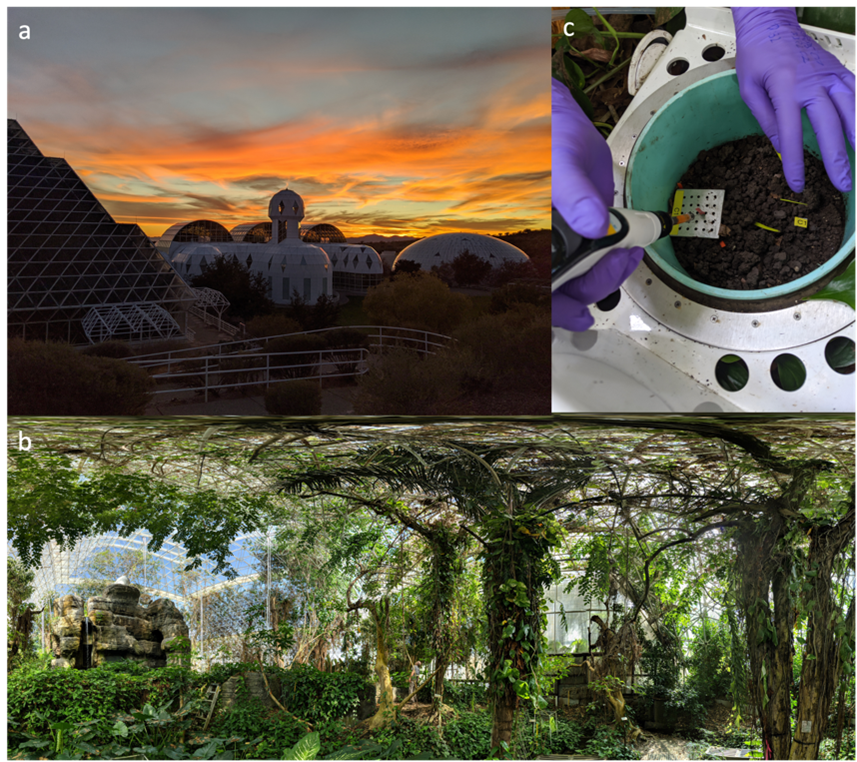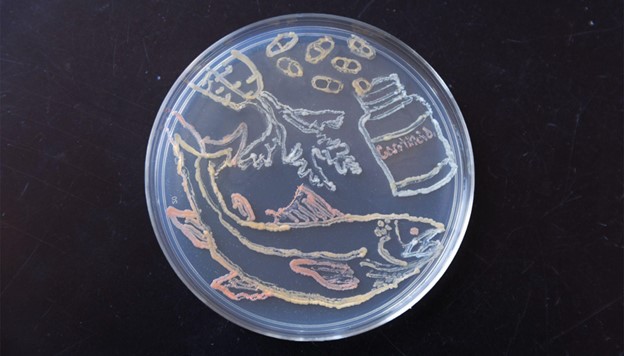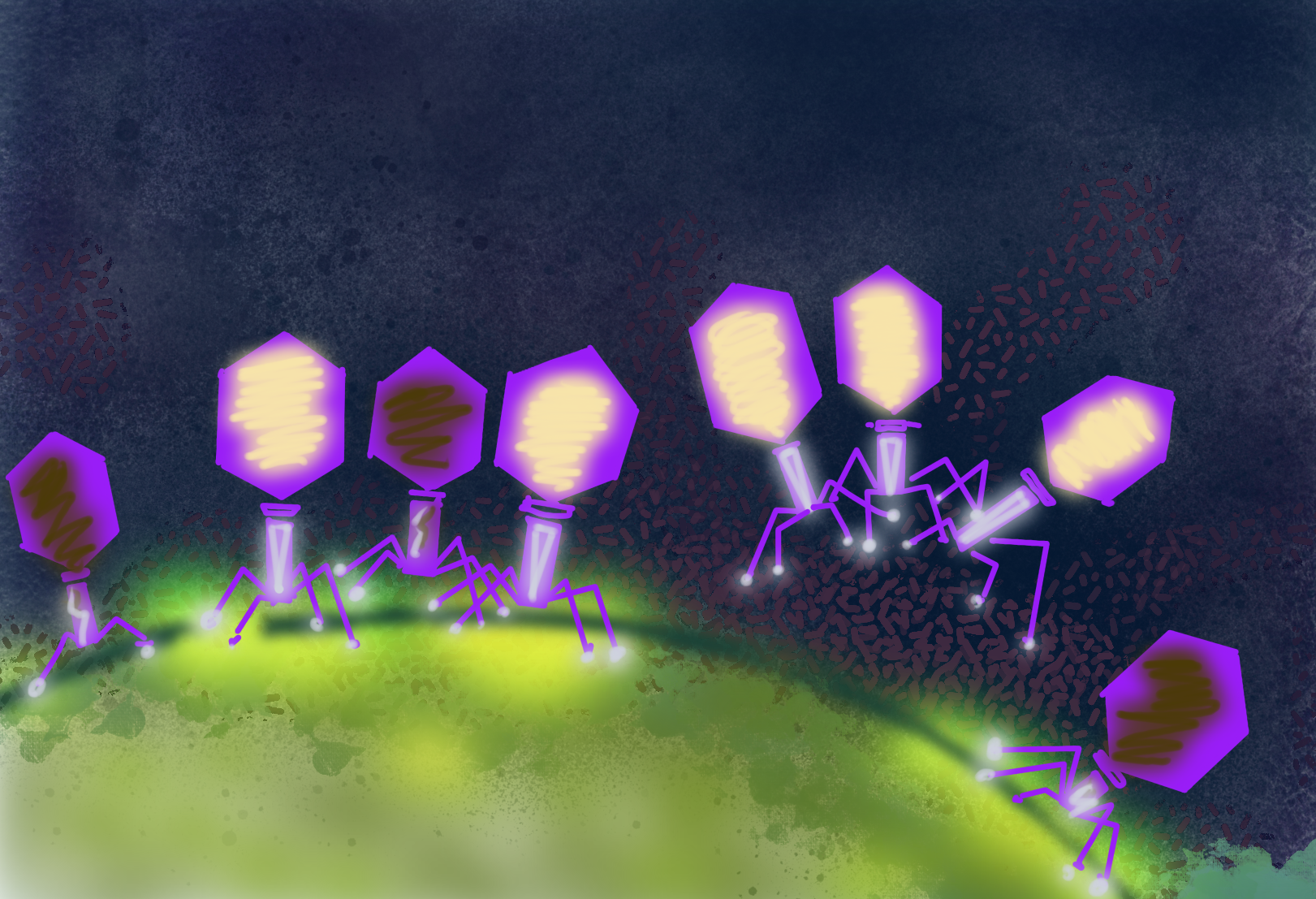During Droughts, Soil Microbes Produce Volatile Carbon Metabolites
In a warmer world, microbes in drought-stricken soils convert less carbon to carbon dioxide and more to volatile intermediates.

The Science
Volatile organic compounds (VOCs) are chemicals that contain carbon and that can move between liquids and air. Microbes usually use the carbon in VOCs as a food source. However, microbes can also release VOCs as gases that can escape the soil and enter the atmosphere. In this study, a team of scientists used an isotope of carbon to track how soil microbes produce and use volatile carbon. They conducted the study in an enclosed, artificial tropical rainforest and discovered that microbes switch from growing to producing stress related biological molecules, including VOCs, during drought. These findings show that drought could enhance the loss of carbon from soils.The Impact
Carbon pools in soils are several times larger than the amount of carbon dioxide in the atmosphere. To understand the global carbon cycle, scientists need to characterize the degree to which microbes influence the stabilization of carbon in soil versus the release of carbon to the atmosphere. This study demonstrates that drought can have a large effect on how microbes process carbon. The research found that microbes transition from converting carbon into biomass to instead converting carbon into less stable forms, such as VOCs, which can escape to the atmosphere. Scientists expect droughts to increase in duration and frequency due to climate change. The study suggests that drier climates can lead to enhanced carbon loss from soil as VOCs.
Summary
A multi-institution team of scientists examined the effect of drought on soil microbial activity and carbon allocation in the artificial tropical rainforest at Biosphere 2. The researchers tracked carbon into carbon dioxide and VOCs using position-specific carbon-13 pyruvate. They examined microbial activity with metagenomics/metatranscriptomics at the Joint Genome Institute and metabolomics at the Environmental Molecular Sciences Laboratory, both Department of Energy Office of Science user facilities.
The overall findings suggested that as microbes entered a stress-induced state during drought, they decreased carbon allocation to biomass growth, indicated by decreased amounts of amino acids, amino sugars, proteins, and lipids, all components of microbial biomass. Rather, microbes shifted carbon allocation to biosynthesis of stress biomolecules, indicated by increased concentrations of osmolytes (i.e., trehalose) and carbon-13 labeled VOCs (acetone, acetate, and diacetyl). Furthermore, microbial communities lost their ability to efficiently cycle carbon and recoup metabolic intermediates (i.e., acetate and acetone). Together, this led to the loss of volatile intermediate metabolites to the atmosphere, representing a potential trend of decreased carbon stabilization during drought conditions.
Contact
Laura K. Meredith
University of Arizona
laurameredith@arizona.edu
Linnea K. Honeker
Lawrence Livermore National Laboratory
Honeker1@llnl.gov
Funding
This material was based on work supported by the Department of Energy (DOE) Office of Science, Biological and Environmental Research Program. A portion of this research was performed under the DOE Facilities Integrating Collaborations for User Science program and used resources at the Joint Genome Institute and the Environmental Molecular Sciences Laboratory, both DOE Office of Science user facilities. The research was also supported in part by the European Research Council and the National Science Foundation CAREER Award, Biosphere 2 through the University of Arizona, the BIO5 Postdoctoral Fellowship, the German Federal Ministry of Education, the Max Planck Society, and the Philecology Foundation.Publications
Honeker, L.K., et al., Drought re-routes soil microbial carbon metabolism towards emission of volatile metabolites in an artificial tropical rainforest. Nature Microbiology 8, 1480–1494. (2023). [DOI: 10.1038/s41564-023-01432-9]Related Links
Soils in drought stress leak more volatile organic compounds into the atmosphere, The University of Arizona News.Highlight Categories
Performer: University , DOE Laboratory , EMSL , JGI
Additional: International Collaboration



